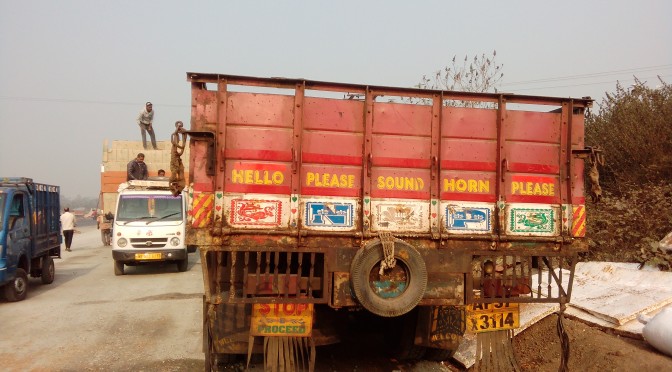The pace of Bangladesh and India is nonstop.
Gone are the days of peaceful meandering in the mountains of the Pamirs or wishful thinking in the desert stretches of Uzbekistan.
Our thoughts now come in rapid disconnected spurts, and our senses are overwhelmed with a constant attack of all things sweet, beautiful, ugly and gut-wrenching gross. There is little time for long, pensive reflections. Paying attention to what’s coming toward us or behind us takes all our energy.
South Asia is where our six senses stay on most of the day.
This is some of what we see:
– Trucks and buses racing along major roadways
– Tuk-tuk and bicycle rickshaws jockeying for space in the shoulders
– Rice fields in various states of green and yellow, growing or being harvested
– Women making cow dung paddies, which will be used for cooking fires when they are dry enough
– Men drinking tea and chewing betelnut
– People working the land by hand and with primitive tools
– Trucks delivering fancy new tractors
– Cows, goats, water buffalo and chickens munching on whatever they find around their houses
– Dogs and crows picking through heaps of garbage
– Bright yellow fields of mustard flowers
– People everywhere, all the time
– Advertisements for steel, cement and telecommunications companies
– Boys and girls in uniforms going to school
– People with amputated legs rolling themselves along busy city streets, and people with polio struggling to walk
– Mud shacks with corrugated tin or palm branch rooftops
– Brick and cement houses with hay stacked on the rooftop
– People bent over sweeping the front of their homes and businesses
– Kids flying kites at sunset
– Cows curled up on the road divider
– People squatting anywhere they want, without shame, urinating or defecating
– Monkeys jumping from housetops to window bars
– Bricks lined up into columns and rows
– Clay teacups smashed near tea stands
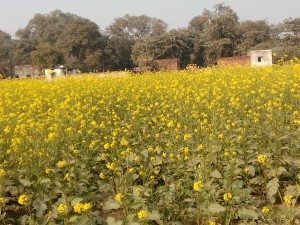
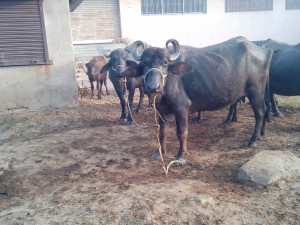
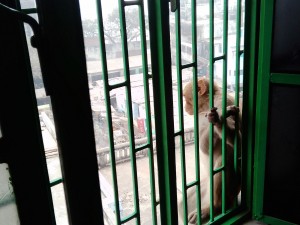
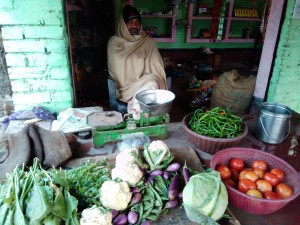
What we hear:
– Horns, and more horns… trucks, buses, cars and motos creating a 24-hour cacophony of noise pollution
– Bicycle bells
– Bollywood music
– Hindu mantras being recited
– The deep tone of bells being rung at Hindu temples
– Muslim calls to prayer
– People talking and words we’ll never understand
– The now and again tweeting of birds
– The revving of motorcycle engines
– The clanging of metal hitting empty truck containers
– People preparing meals, moving pots from one place to another
– “One photo. Please. Selfie,” from men on mopeds
– Electricity sizzling through high-voltage wires
India-morning (I hope this links to sound clip…this is what we heard walking in thick fog on Christmas morning about 40 kilometers from Varanasi, India.)
What we smell:
– Rice cooking
– Sweet tea
– Roti and chapatti bread baking on hot coals
– The earthiness coming off wood, charcoal and cow-dung fires
– The putrid smell of decomposing flesh of dead cows, goats and dogs laying on the roadside
– The unbreathable, choking smell of half-burned trash, rubber tires and plastic packaging
– Brake and transmission fluid from roadside repair shops
– Exhaust fumes from trucks and buses
– The floral scent of the soap we carry and use at public toilets where the bitter stench of human waste
– The fresh, clean smell of detergent arriving downwind from a river or pond where women are washing clothes
– A variety of aromatic incense sticks and butter-oil lamps being burned in temples, homes, businesses and on truck dashboards
– Our stinky feet
– Hot pots of soup, curry and fried sweet dough
– The musky cologne or aftershave of a man who got shaved at a barbershop stand
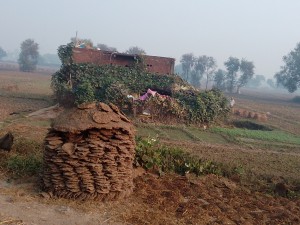
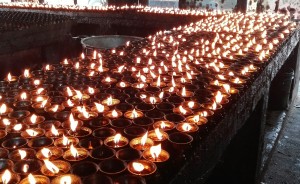

What we taste:
– Sugar, cardamom and a masala spice mix in tea
– The chalky sensation of crushed lentils from the dal we pour over white rice
– Cauliflower, potato and other vegetables soaked in curry sauce
– The thick, buttery tomato sauce of chicken tikka masala
– The spicy kick of chili peppers
– Raw red onions and crunchy white radishes
– Ghee-drenched naan bread
– The simplicity of a piece of hot bread
– Dirt, dust and more dirt and dust being hurled at us with every step we take
– Chinese-style stir fried noodles
– Omelettes and hard boiled eggs with a lot of salt
– Coriander chutney with our dense potato-filled samosas
– Extra sweet dessert pieces with pieces of cashews
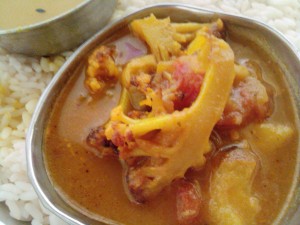

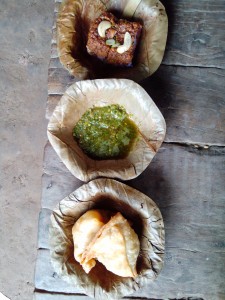

What we touch and feel:
– Dirt scratching our faces
– The sun warming our hands
– Fog creeping into our bones
– Damp humidity keeping our just-washed laundry wet for two or three days
– The hard, cracked skin of a farmer when we shake hands
– The soft flutter of hands touching when people don’t seem to understand our offer of a firm hand shake.
– Cold ground water pumped to rinse the dirt off our faces
– Cold buckets of water poured over our bodies to wash away the day’s walking grime
– The occasional luxury of a hot shower and steam
– The joy of shampoo
– The synthetic plasticy feel of our sleeping bags against our arms and legs
– The once-in-a-while feel of clean cotton sheets against our arms and legs
– Sweat dripping down our backs
– A constant state of dirtiness and grime clinging to every part of our body
– The bliss of slipping into our sleeping bags and falling asleep
What our sixth sense of intuition tells us:
– This will be a good place to sleep tonight
– He has good eyes, we can trust him
– Hmmm… let’s watch that group over there… something looks off
– Let’s ask that family if we can sleep inside their gate
– The urge to connect and spend time with nice people
– The urge to stay all day in our guesthouse room and shut the world outside
– Just keep walking…it’s the only way we can keep going forward.
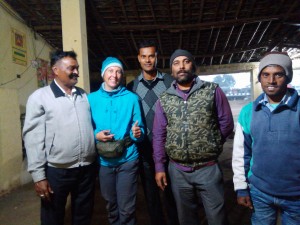
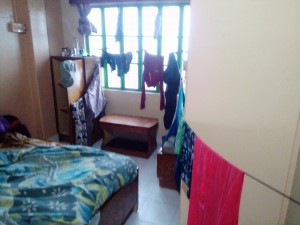
The moments when we can think
In the summer, our thoughts were long. We discussed world issues, and “in the world according to us,” we solved big problems of poverty, overpopulation, food and resource shortages and unemployment. We had hours where we could walk side-by-side and chat.
In South Asia, our thoughts come as fast as traffic moves. They are short, quick and unconnected. We rarely walk together, and we must always keep a sharp eye on the road.
My thoughts in Bangladesh and India show up like a list of to-dos.
– Email my sister
– Call Vivian
– Check my bank statement
– Upload photos to the blog
– Sew my socks
– Find a shoemaker
– Buy cookies for the morning
Occasionally, I mull over other things.
– How much rice does Bangladesh and India produce?
– How much of it is for commercial production and how much of it is self-farming?
– How are people really dealing with the demonetization of the 500 and 1,000 rupee notes?
– Why can’t south and southeast Asia figure out how to manage its disgusting piles of trash?
– How did it become a customary habit to throw everything on the ground? How hard is to throw things into a garbage bin?
-Ugh! Why do they use these little tiny disposable plastic cups for two sips of tea?
– When will my shoulder stop hurting?
– Why do I keep walking?
There are always questions. The answers are lost in the wind of a passing truck hurrying to get somewhere down the road.


